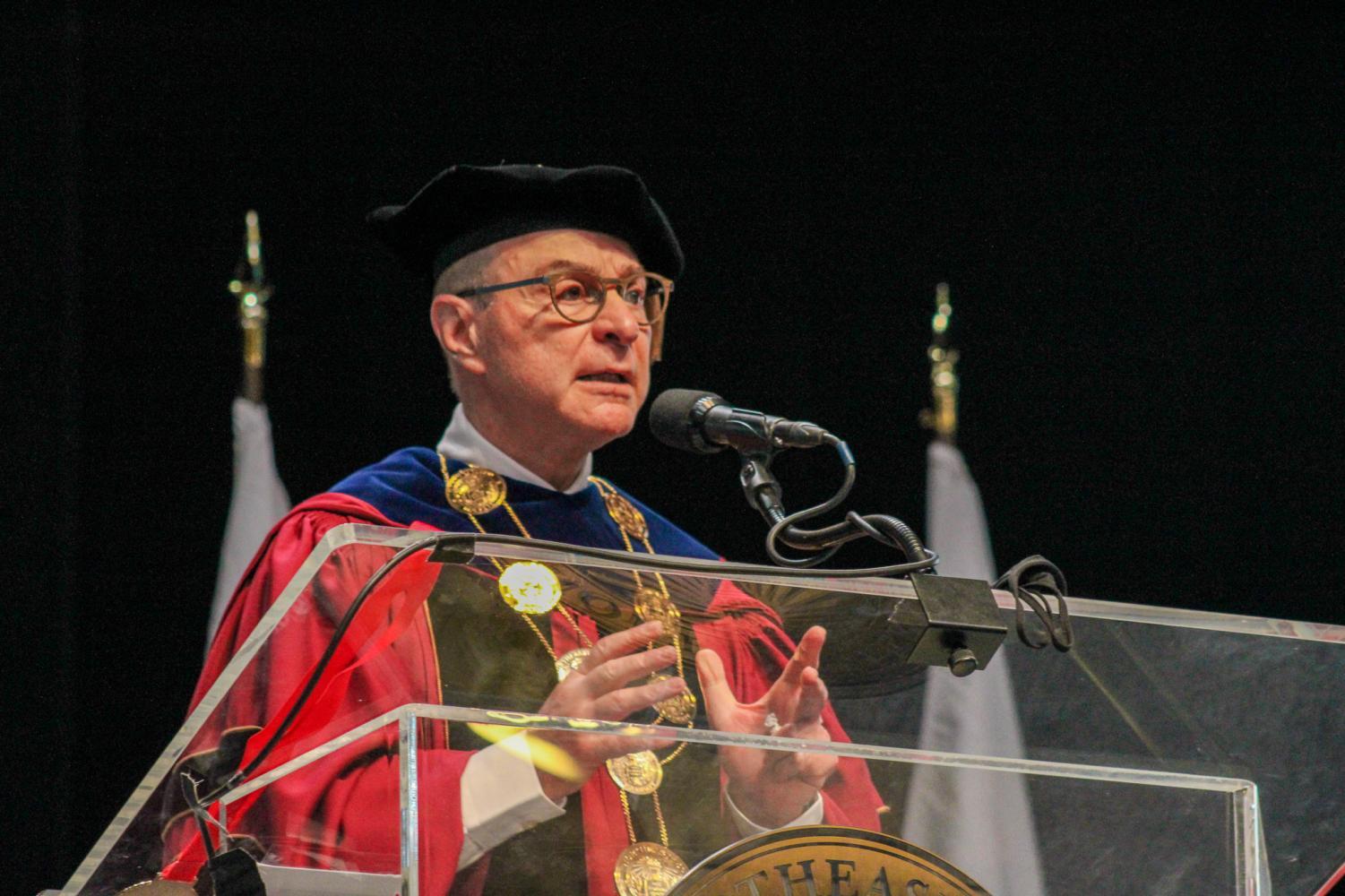In December 2024, an eclectic group of more than 30 powerful CEOs, billionaires and business leaders from across the globe joined Northeastern President Joseph E. Aoun at Northeastern’s Boston campus to outline the university’s top priorities, shaping its framework and future.
The group, Northeastern’s Board of Trustees, is perhaps the most influential entity within the university. But exactly what was discussed last semester — and at every other annual strategic meeting — remains relatively unknown.
While the university’s vision and strategy are ultimately the purview of Aoun and his team of senior vice presidents, the board functions as a “sounding board to test ideas with,” trustee Deborah Dunsire told The Huntington News.
“It’s been an incredibly interesting journey to be a part of,” Dunsire said of her nearly 11 years on the board. When first approached about joining the board, “I didn’t know very much about the university at all,” she said. “I was very interested by [the co-op] model, … President Aoun is one of the most visionary people that I’ve really ever come across.”
University governing boards wield significant power in the world of higher education, yet little is shared about how they function at private institutions. At Northeastern, the Board of Trustees oversees a wide range of issues, from executive salaries to campus expansions.
In an effort to unravel this precise role, The News attempted to directly reach all 32 trustees. Most didn’t respond, and several directed The News to Michael Armini, senior vice president for external affairs. Only Dunsire, the former CEO of biopharmaceutical company Lundbeck, and Anita Nassar, senior managing director of Balyasny Asset Management, agreed to an interview.
The university did not immediately respond to a request for comment on the board’s transparency.
“Visibility is important, and honestly, for Northeastern, I have some trouble with that,” said Kyle Beltramini, a policy research fellow at the American Council of Trustees and Alumni. “I can go to other institutions and I can see what their mission statement is, and oftentimes, on the board websites, I’ll be able to see the board bylaws. I don’t see that in Northeastern, and that can be a problem.”
Northeastern isn’t alone in this — private university boards “are almost always very opaque,” said Eric Kelderman, a senior writer at The Chronicle of Higher Education who covers university governance.
University governing bodies are usually composed of wealthy and successful alumni or others with ties to the institution. Members have a host of responsibilities, including financial oversight and strategic direction, and typically work closely with the university’s leadership.
“It’s always management who proposes the vision and the strategy and the board who oversees it,” Dunsire said. “We’re accountable for testing it, overseeing it, finding out, do we agree that it will get us to the goal that we have for the institution.”
Trustees are not paid by the university but are often donors who strongly believe in the vision of the institution and are expected to hold the university to its articulated mission.
“Trustees are uniquely positioned to act as fiduciaries for that institution because they are not paid by the institution,” Beltramini said. “They are not legally employed by the institution, but they’re lay volunteers serving the institution’s mission.”
One of the most important tasks trustees at all private universities undertake is selecting the university’s president, though all of Northeastern’s current trustees joined the board after Aoun assumed his role in 2006. Presidential evaluation, however, remains a fundamental part of the board’s responsibility.

“Typically, they don’t get involved in details. They hire a good president, they trust the president to run the place and they don’t meddle,” Kelderman said, adding that the board is responsible for giving critical feedback to the administration. “They might offer suggestions, but in general, they’re meant to … have a bigger picture view.”
Richard D’Amore, chair of the Board of Trustees, told The News in a statement that the board’s alignment with university officials has been key to its success.
“Working together, the board and senior leaders have developed strategic plans and a dashboard of metrics to ensure sustained success,” D’Amore wrote. “The results are evident across every dimension of the university’s mission.”
Northeastern trustees skew male and are often alumni, including D’Amore and Alan S. McKim, the namesakes of Northeastern’s School of Business, and Amin J. Khoury, the namesake of the College of Computer Sciences. Other notable trustees include Sir Lucian Grainge, the chair and CEO of Universal Music, and Edward G. Galante, former senior vice president of ExxonMobil.
Two former Mills College trustees joined the board in 2022 after Northeastern absorbed the California school. Only nine of 32 board members are based in Massachusetts, according to The News’ analysis and Northeastern’s website.
!function(){“use strict”;window.addEventListener(“message”,(function(a){if(void 0!==a.data[“datawrapper-height”]){var e=document.querySelectorAll(“iframe”);for(var t in a.data[“datawrapper-height”])for(var r=0;r
